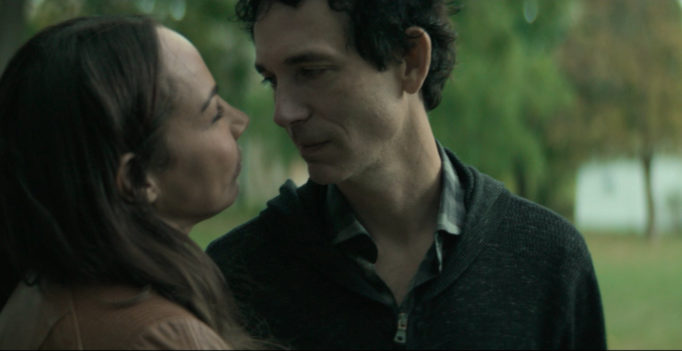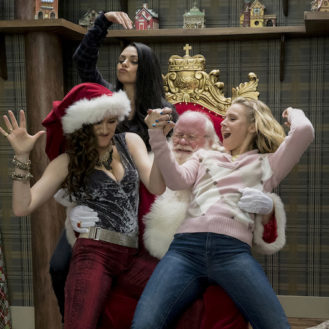From his breakout with My Awkward Sexual Adventure to his recent collaborations with other actors and returning filmmakers, Jonas Chernick has been an actor/screenwriter to watch for. The projects he creates or attaches himself to are filled with an unforgettable, compassionate energy. His latest collaboration with director Jeremy LaLonde (How to Plan an Orgy in a Small Town) and Becky’s Amanda Brugel is one of his strongest efforts to date, but it also might be the most he has challenged himself as a writer and performer.
I spoke with Chernick recently about the creation process behind Ashgrove, ahead of the film’s Canadian premiere at this year’s Canadian Film Fest.
Addison Wylie: You co-wrote Ashgrove with director Jeremy LaLonde and your co-star Amanda Brugel. What was the initial inspiration behind this project. Was this project always going to be a collaboration between the three of you?
Jonas Chernick: Jeremy and I were travelling from the Calgary Film Festival to the Edmonton Film Festival in the fall of 2019 with our last film, James vs. His Future Self, and we carved out the drive to talk about what we wanted to do next. We agreed that whatever it was, it should be something completely different from James vs. His Future Self. We were both feeling like making another comedy would be the expected choice, that’s where both of us feel most comfortable as writers and filmmakers. So we challenged ourselves to go the other way.
I pitched him on something intimate, small and honest – a dissection of a relationship, with two actors, one location, something intense and raw. He was down for that, but Jeremy being Jeremy, he added: “yeah, sure, but the world should be ending outside the front door.” So by the time we pulled into our hotel in Edmonton, we had an outline, a basic premise, and a commitment to making a film in a way that we’d never made a film before. We wanted to build the characters from the ground up, with the actors, and incorporate their ideas and improvisations. So we asked ourselves, “who do we want to be the leading lady, to collaborate with us, to build this world with us?” And we only had one name on that list – Amanda Brugel. We called her when we got to Edmonton, and she said yes immediately, and our collaboration began.
AW: As a screenwriter, do you usually welcome improvisation to your stories? I only ask because there are a few key scenes in Ashgrove that feel so authentic, I wanted to see if that was how the scene was actually written!
JC: I’m a big fan of improvisation as a tool in filmmaking. Several of the films I’ve co-wrote, or acted in, were developed or filmed using improv, starting with my first feature in 2001, Inertia. That script was developed over a year of improvisation sessions with the actors, and the director (my frequent collaborator Sean Garrity) recording the improvs and then writing a script based on them. Sean’s made several films that way, and a few that are actually improvised on camera, which I’ve had the pleasure of acting in. So yeah, I’m trained in improv, and I love the way it lends a naturalistic rhythm to the way characters speak and relate to each other.
With Ashgrove, we had our outline but, yes, part of our approach to how we would make the film was incorporating freedom within the scenes, and exploration. We invited the actors to take risks and to give themselves permission to fail. There were times where we went wildly off script and tried taking scenes in different directions. And, there were scenes where Jeremy threw us curveballs, and the actors were reacting to new information, or revelations, in real time. That was part of the way we designed the process of making this particular film.
AW: Ashgrove is predominantly character driven. You’ve tackled character pieces before, and you’ve been very good in those roles, but this film is on another level of intimacy that I haven’t seen you work in before. If a project is more intimate, does it restrict you more as an actor? Or, does it set more specific parameters that help you build your character’s personality?
JC: The intimacy of this project was part of what got us so excited about telling this story. Amanda, Jeremy and I decided very early on that we wanted to push ourselves to go as deep as we could, to explore these characters from the inside out. Part of that was bringing our own secrets, our own fears, our own personal needs to the story telling. So yes, what you’re picking up on is accurate – in many ways this is the most intimate, personal film I’ve ever written, even though the character is more “different” from me personally than some of the others I’ve created. I don’t think the increased intimacy is restrictive, I actually find it liberating. As I’m getting older, I’m less interested in artifice and I’m increasingly drawn to honesty. I know that Jeremy and Amanda feel that way too, so we were all ready and willing to let ourselves go there.
AW: Because you share the screen with Brugel so often in this movie, does the individual character creation process turn into more of a team effort to make your on-screen relationship believable?
JC: For Ashgrove, we literally built the characters, and their backstories, together. Amanda and Jeremy and I would spend countless hours on Zoom sessions, tracking who these characters are, where they came from, how they relate to one another. Amanda and I have notebooks filled with the history of Jason and Jennifer – how they met, first dates, their relationships with each others’ families, travel stories, how they relate to each other sexually, etc. Most of these details didn’t end up in the film, but sometimes things would come up on camera and we could riff off each other because we knew the “backstory”. But, hopefully, what you feel when you watch the movie is that rich history, those years of experience, layered into their interactions.
AW: You’ve worked with LaLonde before; recently on another movie with sci-fi notes (the aforementioned James vs. His Future Self). With Ashgrove, his filmmaking is still rooted in his brand of realism, but his approach this time around is much more delicate. As someone who has seen his range, what’s the most impressive quality of his filmmaking?
JC: Jeremy is a storyteller, first and foremost. He knows how to spin a yarn. This has always been the most impressive attribute to his craft, for me, and one that I rely on both in our collaborations and also in my own work that I’m developing outside of those collaborations – he’s the first guy I’ll give my next scripts to for feedback. He gets it. He has an innate understanding of how to tell a compelling and original story, how to surprise his audience, and how to bring it all together. His endings are, in my humble opinions, sublime. We co-wrote Ashgrove and James vs. His Future Self, but I will credit Jeremy with the last scene in both of those films. And those last scenes, I think, are doozies.
AW: I found Ashgrove to be a thoughtful and empathetic reach to those struggling and feeling emotional during this recent pandemic. Some people may feel like they don’t want to see a movie that so closely reflects their current overwhelming routine of loneliness and uncertainty. Why do you think it’s important for those people to watch Ashgrove?
JC: We hatched this idea months before anyone had ever heard the word “Covid” – it was just a story we wanted to tell. When the pandemic started, we were like “oh well, I guess this story takes on a different meaning now, or has added connections to our reality”, but it didn’t deter us.
Look, the last thing I want to watch is a “pandemic” movie right now. But, I don’t think of Ashgrove as a pandemic movie. There’s a global health crisis, for sure, and its effecting the characters in a very direct and visceral way. But ultimately, as we come out of the last two years, we’re feeling hopeful, aren’t we? We made it through this thing. We lost a lot of lives, and things are permanently changed, yes, but the world came together, made new rules, shared their science, and found a way through. Ashgrove, ultimately, I hope, reflects that optimism. So rather than slogging through a depressing pandemic movie, why not watch something fictional that conveys that hope?
Ashgrove airs on Saturday, March 26 at 9:00 pm on Super Channel as part of the Canadian Film Fest.
Read Addison Wylie’s review of Ashgrove here!
**********
Do You Tweet? Follow These Tweeple:
Jonas Chernick: @JonasChernick
Addison Wylie: @AddisonWylie





Be the first to comment